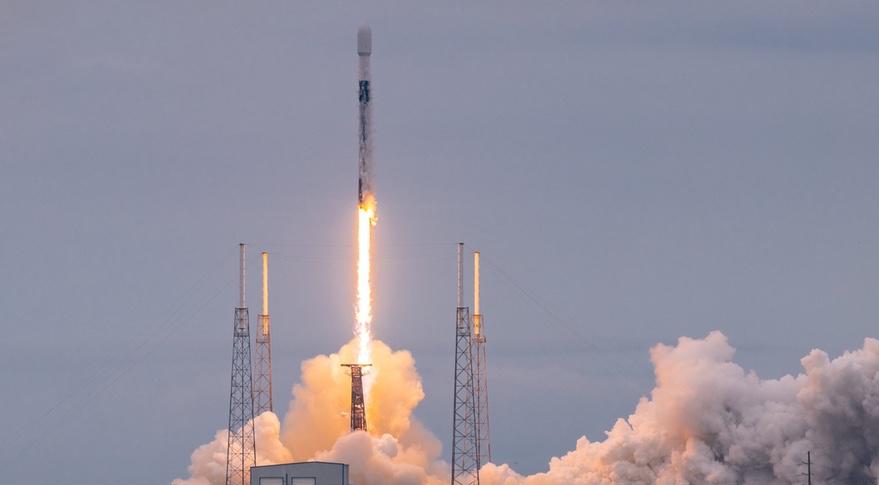Products You May Like
TAMPA, Fla. — Lynk Global said it is still waiting for Spaceflight to rebook a flight for the second commercial satellite in its cellphone-compatible broadband network, four months after the launch services provider’s space tug was kicked off a SpaceX mission.
Lynk-07 was supposed to launch onboard Spaceflight’s Sherpa orbital transfer vehicle (OTV) in April on a Falcon 9 rideshare mission, Lynk Global CEO Charles Miller told SpaceNews.
However, SpaceX decided in March to remove Sherpa from its Transporter 4 mission following concerns about environmental factors affecting the satellites installed on the OTV.
SpaceX also said it would no longer work with Spaceflight on future rideshare missions after launching those remaining on its manifest.
Spaceflight, which used another variant of Sherpa to deploy satellites on SpaceX’s Transporter 5 mission in May, said March 21 that it had found alternative rides for all its customers who could not fly on Transporter 4.
Jodi Sorensen, Spaceflight’s marketing vice president, said July 8 she is “not at liberty to share launch plan details about our customers,” adding that “they’ll have to provide that themselves.”
Miller said via email: “It has been 4 months since Spaceflight was booted off the flight in March, and they have not found us a reflight.”
He said one option to secure an alternative launch for Lynk-07 this year “is to buy direct from SpaceX, but that is a lot more expensive.”
Virginia-based Lynk Global has directly booked a SpaceX launch in November for its third and fourth commercial satellites.
The November mission will use “a new deployer system that is designed to carry up to a half dozen of Lynk’s satellites,” he said.
“Lynk will be the integrator on that launch.”
Funding boost
Lynk Global announced July 5 that it had secured funding from Virginia Venture Partners, the equity investment arm of Virginia’s non-profit Virginia Innovation Partnership Corporation (VIPC), to accelerate its initial commercial services launch in late 2022.
Miller said Lynk Global secured $1 million in funding — the first time VIPC has decided to invest up to its maximum funding cap in a single transaction — which will be used to build and integrate its third and fourth commercial satellites.
VIPC had also invested $50,000 in the startup’s seed-stage several years ago.
Separately, Lynk Global announced July 6 that it had won this year’s car2satellite innovation challenge run by automaker Mercedes Benz and Germany’s space agency.
Competition winners receive technological and economic support in addition to access to a worldwide network of contacts.
Commercial services this year
Lynk Tower 1, Lynk Global’s first commercial satellite, was launched in SpaceX’s Transporter 4 mission in April without Spaceflight’s Sherpa tug.
It is currently the startup’s only operational satellite. The six test satellites Lynk Global deployed earlier to develop its constellation have been shut down or de-orbited.
According to Miller, Lynk Global will be able to launch initial text messaging, emergency alerts and internet of things services before the end of this year with four operational satellites in low Earth orbit.
The startup has signed contracts with 12 mobile network operators (MNOs) that want “one or more of these services” for their subscribers.
Of these, Lynk Global has only announced deals in the Bahamas, Papua New Guinea, Central African Republic, Solomon Islands and Mongolia.
Miller said the startup is in “advanced contract negotiations” with more than two dozen other MNOs.
He said customers using initial services would be able to send and receive text messages with existing smartphones about four to eight times a day, depending on their latitude.
Lynk Global’s initial satellites will pass over customers at higher latitudes more frequently than those closer to the equator.
For IoT services designed for small, low-power devices, he said “there are many use cases where remote monitoring of equipment several times a day is more than good enough.”
Lynk Global builds its “pizza-box shaped” spacecraft in-house, and plans to deploy more than 50 of them before the end of 2023 to “provide an order of magnitude more [satellite] overpasses.”
Depending on their latitude, Miller said its average user will be in the range of a satellite overpass every 15-30 minutes by the end of 2023.
Lynk Global is not the startup seeking to deploy a broadband constellation with phased array antennas that connect directly to standard smartphones.
Texas-based AST SpaceMobile expects SpaceX will launch the BlueWalker 3 test satellite for its cellphone-compatible constellation in the week of Aug. 15.
SpaceX is also slated to launch AST SpaceMobile’s first commercial BlueBird satellite in 2023.
AST SpaceMobile aims to have deployed 110 BlueBird satellites by the end of 2024 to provide substantial mobile coverage.
